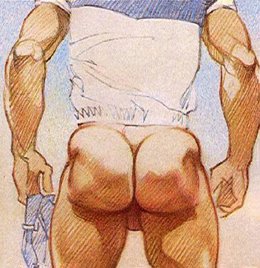Hollywood Finally Gets It Right
Brokeback Mountain
Hollywood Finally Gets It Right
by Misty S. Irons
Last summer when I got wind of the upcoming gay pride parade in West Hollywood, it crossed my mind to make the 20 minute drive south to see what it was all about. Yet afterward when I heard that they had brought in Paris Hilton as a last minute grand marshall, any traces of regret I might have had for missing it instantly evaporated. Likewise I gave up watching "Will and Grace" about three seasons in when they started parading in a line of guest celebrities on a regular basis. To me it was a sign that from now on the show was going to be more about patronizing gays than clever writing. Apparently Hollywood thinks that associating with gays and lesbians is about image. It's mainly about looking cool and hip. And the gay community, seizing the opportunity for glamorous publicity, can hardly resist entering into a deal with Hollywood where they are ultimately being more used than understood.
But what I find most annoying is this: It has been five years since I started this website, and after a lot of clumsiness on my part and a lot of patience on theirs, currently almost half of my friends are gay. Yet there is nothing about what I've learned over the years about my friends' lives that even remotely relates to why Paris Hilton ought to be grand marshall of a pride parade, or why anyone ought to be enamored with Cher. What, I wonder, does any of this showy ridiculousness have to do with the reality that I see every day in the lives of these people that I care about?
The reality of being gay, I assure you, has nothing to do with a pink feather boa. It has been about seeing courage and quiet suffering, and identifying with faith and struggle and pain that has drawn me into people's lives. And it's not like you can just come roaring up to people in your minivan with your marriage, your three kids, and your Bible and expect them to bare their souls to you. These things are revealed in layers and only over time. You have to hang out, build trust, listen, consider, doubt, put your foot in your mouth, search your own soul, and then maybe, just maybe, your heterosexual brain might establish a fuzzy idea of what it is like to live as a gay person in an ignorant and unforgiving world.
There is so much to be told, and so few words adequate to describe it. It is the kind of thing that I have often wished I had an artistic medium such as literature or film to point my straight friends to whenever they come up to me looking for guidance and an explanation. Something I have been certain Hollywood would fail to provide.
Until now. It took a Taiwan-born director possessing an outsider's keen insight into American culture to finally get it right. Brokeback Mountain is a movie long overdue, because for once it is about the kind of people who more closely resemble the homosexuals I know, and tells the truth about their lives. Guys who act like guys, raised in conservative communities with traditional values, who if you asked them whether they chose to be homosexual would snappishly answer, "Why in the hell would I choose it?" or, "What the hell kind of question is that?"
The story is presented largely from the perspective of Ennis Del Mar, played by Heath Ledger in a performance that will be etched in my memory for quite some time. Gruff, stoic, reticent, he's the last guy on the prairie you'd suspect of being gay. His sudden, passionate response to sheepherding partner Jack Twist (Jake Gyllenhaal) as they shared a tent one cold night on Brokeback Mountain seems to come out of nowhere. It may not be the hole in the script that some reviewers think it is. The point is that no one sees it coming, not the audience and least of all Ennis himself. And if passion was strong that night, the ensuing shame that takes hold of Ennis the next morning becomes an equally formidable force.
As if to heap further damnation on their souls, Ennis' and Jack's summer-long affair results in the neglect and loss of some of the sheep and falling into disfavor with their employer. It is as if guilt inevitably intrudes into their secret paradise and finds them out. Then when the summer finally draws to a close and they must leave Brokeback Mountain and each other, you can see Ennis hardening himself for the grim reality of the rest of his life. Whatever feelings he has for Jack he must now bring into subjection with an iron fist. He must steer himself with a steady hand into an emotionally bleak future, and try to forget his soul had ever known the vivid colors of bliss. His plans to marry his fiancée Alma (Michelle Williams) remain as fixed as his jaw and as inevitable as death. He mentions them to Jack with the casual acceptance of talking about the weather. It's coming, it's a fact, and there's not much more to it than that.
Funny how whenever a discussion about homosexuality erupts among evangelical Christians, there's always somebody who wants to put forward the bright idea that the best solution is for a man to get married and keep having sex with his wife until he becomes a true hetero convert. Maybe one reason why I don't see a host of female volunteers lining up to administer "the cure" has to do with the slow pain you see inflicted upon the wives of Ennis and Jack during the years of their respective marriages. Alma looks like she is perpetually cycling through the Five Stages of Grief. Jack's wife Lureen (Anne Hathaway) becomes increasingly shallow, bleached and plastic. Encouraging gay men to "work toward the goal of heterosexual marriage" may sound like harmless, biblical advice when dispensed across the mahogany desk in a pastor's well-vacuumed office, or printed on crisp, white sheets from the "Recommendations of the Committee to Study the Issue of Homosexuality" report handed out by your church denomination. But it is in fact quite disastrous when played out in the real lives of actual human beings.
Yet the beauty of this story is that nobody preaches or bullies Ennis into any of it. What is expected of him as an adult male living in 1963 Wyoming, he expects of himself, and he hardly knows otherwise. Anyone who has been raised with religious or traditional values understands immediately what Ennis is all about. You recognize something of yourself in him. Marriage and family, church and community have always been in the air you breathe, their rhythms and traditions imparting the values and expectations you've known since earliest memory. Ennis would gladly take his place in the current and ride easily along, if it did not set him on a collision course with his own human needs. If there's anyone who might be able to endure the barrenness of a life devoid of any meaningful love and emotional connection, you figure it would be Ennis. The problem is, once he does experience that connection with Jack, it is for him like breathing oxygen for the first time. The agony of having to part from Jack, and his subsequent inability to find satisfaction in his marriage to Alma, however devoted a wife she is, only intensifies his suffocation.
For the most part, were it not for the number of empty beer bottles and cigarette butts littered around him, there would be little indication that Ennis feels anything at all. He seems to have a grip, weathering his life as if he were squinting into a dust storm. He does not invite pity. He does not even seem to pity himself. No wonder then, when Ennis finally has a chance to meet up with Jack again for the first time in four years, you are hardly prepared to witness the desperation that overcomes him. The loss of control. The frantic activity. The impulsive flight from home. Only then does it dawn on you what he is suffering inside, and how much it must be costing him to keep it so thoroughly submerged.
Even a guy like Ennis can't stay submerged forever, so he allows himself to come up for air twice a year. His biannual "fishing trips" with Jack become the routine of his life. But in spite of his determined efforts to hang onto a normal life, while indulging in only the bare minimum of what can sustain him emotionally and sexually on the side, he ends up hurting everyone around him. No one is happy, least of all himself, and things begin to unravel. Caught between his adamant refusal to live openly as "queer" and his fundamental need for Jack, he is never able to give himself fully to anyone. For him there is no peace, no rest, and no safety anywhere. Nor does he believe that there are any answers. Deeply shuttered within himself, he only knows that whatever his rage, whatever his pain and loneliness, he must simply endure. The few times you do see his granite-like exterior crack and anguish and emotion pour out, it is almost too heart-wrenching to watch. You wish there was something that could be done to give him relief from his daily crucible. But in view of his situation and knowing Ennis himself, you come up empty, and all you can do is watch and suffer with him.
Some evangelicals are condemning Brokeback Mountain for "approving" of homosexuality. Strange accusation, since there is no one in the movie who actually does approve of homosexuality. The cast of characters are all traditional, family-values people who are deeply uncomfortable if not outright hostile to the idea of men falling in love with men. And the men who are doing the falling in love are the same guys you are likely to see standing in line in front of you on Election Day to vote Republican, or maybe even to vote in favor of the state measure seeking to ban same-sex marriage from legal recognition. I've known a few of those types myself.
Brokeback Mountain doesn't ask us to approve of homosexuality. But it does ask us to face up to the truth of what homosexuality is and how profoundly it impacts the person who finds him- or herself so afflicted. Most importantly, it raises the question of whether we who don't approve of it as morally right shouldn't feel more compassion toward friends, family members and neighbors who find themselves in that painful dilemma through no fault of their own. After all, the crux of their pain lies in the very fact that they don't approve of it either. And they can appreciate all too well what parents, fellow church members or hunting buddies might think if they were to find out, because it would be the same horrified reaction as their own, and they are quite frankly scared to death.
Such a person would never dream of asking for your "approval." But it would do them a world of good if people were simply to have a heart, invite them for coffee, assure them the door is always open, and give some indication they aren't interested in humiliating them or rounding up their friends to beat the stuffing out of them in a back alley. It is not much to ask, and doesn't cost much to give either.
Posted on January 9, 2006
MusingsOn.com
© 2006 by Misty S. Irons
Hollywood Finally Gets It Right
by Misty S. Irons
Last summer when I got wind of the upcoming gay pride parade in West Hollywood, it crossed my mind to make the 20 minute drive south to see what it was all about. Yet afterward when I heard that they had brought in Paris Hilton as a last minute grand marshall, any traces of regret I might have had for missing it instantly evaporated. Likewise I gave up watching "Will and Grace" about three seasons in when they started parading in a line of guest celebrities on a regular basis. To me it was a sign that from now on the show was going to be more about patronizing gays than clever writing. Apparently Hollywood thinks that associating with gays and lesbians is about image. It's mainly about looking cool and hip. And the gay community, seizing the opportunity for glamorous publicity, can hardly resist entering into a deal with Hollywood where they are ultimately being more used than understood.
But what I find most annoying is this: It has been five years since I started this website, and after a lot of clumsiness on my part and a lot of patience on theirs, currently almost half of my friends are gay. Yet there is nothing about what I've learned over the years about my friends' lives that even remotely relates to why Paris Hilton ought to be grand marshall of a pride parade, or why anyone ought to be enamored with Cher. What, I wonder, does any of this showy ridiculousness have to do with the reality that I see every day in the lives of these people that I care about?
The reality of being gay, I assure you, has nothing to do with a pink feather boa. It has been about seeing courage and quiet suffering, and identifying with faith and struggle and pain that has drawn me into people's lives. And it's not like you can just come roaring up to people in your minivan with your marriage, your three kids, and your Bible and expect them to bare their souls to you. These things are revealed in layers and only over time. You have to hang out, build trust, listen, consider, doubt, put your foot in your mouth, search your own soul, and then maybe, just maybe, your heterosexual brain might establish a fuzzy idea of what it is like to live as a gay person in an ignorant and unforgiving world.
There is so much to be told, and so few words adequate to describe it. It is the kind of thing that I have often wished I had an artistic medium such as literature or film to point my straight friends to whenever they come up to me looking for guidance and an explanation. Something I have been certain Hollywood would fail to provide.
Until now. It took a Taiwan-born director possessing an outsider's keen insight into American culture to finally get it right. Brokeback Mountain is a movie long overdue, because for once it is about the kind of people who more closely resemble the homosexuals I know, and tells the truth about their lives. Guys who act like guys, raised in conservative communities with traditional values, who if you asked them whether they chose to be homosexual would snappishly answer, "Why in the hell would I choose it?" or, "What the hell kind of question is that?"
The story is presented largely from the perspective of Ennis Del Mar, played by Heath Ledger in a performance that will be etched in my memory for quite some time. Gruff, stoic, reticent, he's the last guy on the prairie you'd suspect of being gay. His sudden, passionate response to sheepherding partner Jack Twist (Jake Gyllenhaal) as they shared a tent one cold night on Brokeback Mountain seems to come out of nowhere. It may not be the hole in the script that some reviewers think it is. The point is that no one sees it coming, not the audience and least of all Ennis himself. And if passion was strong that night, the ensuing shame that takes hold of Ennis the next morning becomes an equally formidable force.
As if to heap further damnation on their souls, Ennis' and Jack's summer-long affair results in the neglect and loss of some of the sheep and falling into disfavor with their employer. It is as if guilt inevitably intrudes into their secret paradise and finds them out. Then when the summer finally draws to a close and they must leave Brokeback Mountain and each other, you can see Ennis hardening himself for the grim reality of the rest of his life. Whatever feelings he has for Jack he must now bring into subjection with an iron fist. He must steer himself with a steady hand into an emotionally bleak future, and try to forget his soul had ever known the vivid colors of bliss. His plans to marry his fiancée Alma (Michelle Williams) remain as fixed as his jaw and as inevitable as death. He mentions them to Jack with the casual acceptance of talking about the weather. It's coming, it's a fact, and there's not much more to it than that.
Funny how whenever a discussion about homosexuality erupts among evangelical Christians, there's always somebody who wants to put forward the bright idea that the best solution is for a man to get married and keep having sex with his wife until he becomes a true hetero convert. Maybe one reason why I don't see a host of female volunteers lining up to administer "the cure" has to do with the slow pain you see inflicted upon the wives of Ennis and Jack during the years of their respective marriages. Alma looks like she is perpetually cycling through the Five Stages of Grief. Jack's wife Lureen (Anne Hathaway) becomes increasingly shallow, bleached and plastic. Encouraging gay men to "work toward the goal of heterosexual marriage" may sound like harmless, biblical advice when dispensed across the mahogany desk in a pastor's well-vacuumed office, or printed on crisp, white sheets from the "Recommendations of the Committee to Study the Issue of Homosexuality" report handed out by your church denomination. But it is in fact quite disastrous when played out in the real lives of actual human beings.
Yet the beauty of this story is that nobody preaches or bullies Ennis into any of it. What is expected of him as an adult male living in 1963 Wyoming, he expects of himself, and he hardly knows otherwise. Anyone who has been raised with religious or traditional values understands immediately what Ennis is all about. You recognize something of yourself in him. Marriage and family, church and community have always been in the air you breathe, their rhythms and traditions imparting the values and expectations you've known since earliest memory. Ennis would gladly take his place in the current and ride easily along, if it did not set him on a collision course with his own human needs. If there's anyone who might be able to endure the barrenness of a life devoid of any meaningful love and emotional connection, you figure it would be Ennis. The problem is, once he does experience that connection with Jack, it is for him like breathing oxygen for the first time. The agony of having to part from Jack, and his subsequent inability to find satisfaction in his marriage to Alma, however devoted a wife she is, only intensifies his suffocation.
For the most part, were it not for the number of empty beer bottles and cigarette butts littered around him, there would be little indication that Ennis feels anything at all. He seems to have a grip, weathering his life as if he were squinting into a dust storm. He does not invite pity. He does not even seem to pity himself. No wonder then, when Ennis finally has a chance to meet up with Jack again for the first time in four years, you are hardly prepared to witness the desperation that overcomes him. The loss of control. The frantic activity. The impulsive flight from home. Only then does it dawn on you what he is suffering inside, and how much it must be costing him to keep it so thoroughly submerged.
Even a guy like Ennis can't stay submerged forever, so he allows himself to come up for air twice a year. His biannual "fishing trips" with Jack become the routine of his life. But in spite of his determined efforts to hang onto a normal life, while indulging in only the bare minimum of what can sustain him emotionally and sexually on the side, he ends up hurting everyone around him. No one is happy, least of all himself, and things begin to unravel. Caught between his adamant refusal to live openly as "queer" and his fundamental need for Jack, he is never able to give himself fully to anyone. For him there is no peace, no rest, and no safety anywhere. Nor does he believe that there are any answers. Deeply shuttered within himself, he only knows that whatever his rage, whatever his pain and loneliness, he must simply endure. The few times you do see his granite-like exterior crack and anguish and emotion pour out, it is almost too heart-wrenching to watch. You wish there was something that could be done to give him relief from his daily crucible. But in view of his situation and knowing Ennis himself, you come up empty, and all you can do is watch and suffer with him.
Some evangelicals are condemning Brokeback Mountain for "approving" of homosexuality. Strange accusation, since there is no one in the movie who actually does approve of homosexuality. The cast of characters are all traditional, family-values people who are deeply uncomfortable if not outright hostile to the idea of men falling in love with men. And the men who are doing the falling in love are the same guys you are likely to see standing in line in front of you on Election Day to vote Republican, or maybe even to vote in favor of the state measure seeking to ban same-sex marriage from legal recognition. I've known a few of those types myself.
Brokeback Mountain doesn't ask us to approve of homosexuality. But it does ask us to face up to the truth of what homosexuality is and how profoundly it impacts the person who finds him- or herself so afflicted. Most importantly, it raises the question of whether we who don't approve of it as morally right shouldn't feel more compassion toward friends, family members and neighbors who find themselves in that painful dilemma through no fault of their own. After all, the crux of their pain lies in the very fact that they don't approve of it either. And they can appreciate all too well what parents, fellow church members or hunting buddies might think if they were to find out, because it would be the same horrified reaction as their own, and they are quite frankly scared to death.
Such a person would never dream of asking for your "approval." But it would do them a world of good if people were simply to have a heart, invite them for coffee, assure them the door is always open, and give some indication they aren't interested in humiliating them or rounding up their friends to beat the stuffing out of them in a back alley. It is not much to ask, and doesn't cost much to give either.
Posted on January 9, 2006
MusingsOn.com
© 2006 by Misty S. Irons










0 Comments:
Post a Comment
<< Home